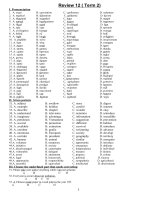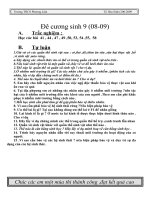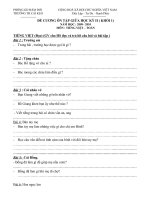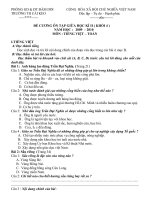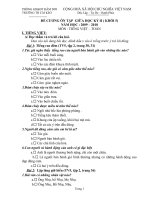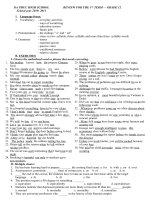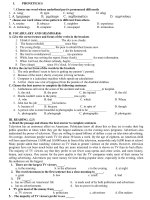de cuong 12 ki 1
Bạn đang xem bản rút gọn của tài liệu. Xem và tải ngay bản đầy đủ của tài liệu tại đây (139.58 KB, 7 trang )
Da phuc high school
School year 2010- 2011
Review for the 1
st
term Grade 12–
1. Language focus:
2. Vocabulary: - everyday activities
- ways of socializing
- education system
- future jobs
3. Pronunciation: - the endings “ s” and “ ed”
- stress in two- syllable, three- syllable and more than three- syllable words
4. Grammar: - tenses
- reported speech
- passive voice
- conditional sentences
- relative clauses
B. EXERCISES
I. Choose the underlined word or phrase that needs correcting.
1. My mother knows how for prepare Chinese
food.
2. The boy stands over there is my son.
3. It takes 90 minutes for going to Hanoi by plane.
4. My son would rather playing tennis than
football.
5. John had his car to repair yesterday.
6. It is three months since he works in this company.
7. Never I have seen such a good film before.
8. Two years are a long time to wait.
9. If I had asked you, you wouldn’t accept.
10. This is the house in that we often stay in summer.
11. She is the most beautiful woman who I have ever
met.
12. In a hospital everything have to be very clean.
13. I don’t think that easy to speak English well.
14. The doctor strongly advised her take a few days’
rest
15. We will be late if we not hurry.
16. Let’s go to swim now. It’s very hot.
17. I can’t get my car start in cold mornings.
18. Don’t forget locking the door before going to bed.
19. I think your origin plan was the best one.
20. . Dirty air is harmful for our health.
21. . The police made the robbers telling the true
22. Please tell us the reason when he left without saying
goodbye.
23. The novel was such interesting that I had read it all
night.
24. Smoking is harmful not only to smokers so to non-
smokers.
25. When he goes to see them last night, they were playing
cards.
26. Before went abroad, he had finished his English
course at the English –speaking Centre.
27. There comes my bus! I must go now. Don’t forget
giving me a call.
28. The problems of pollution are too difficult for us to
solving.
29. Although the bad traffic, I managed to arrive at the
meeting on time.
30. In my opinion, a most beautiful place in Vietnam is
Dalat.
31. Did you say that you will have a lot of things to do the
following week.
32. . Whenever problems come up we often discuss about
them frankly.
33. The artist whom picture we saw yesterday is also a
concert pianist.
34. . Many folk songs have been wrote about farmers and
country life
35. George isn’t enough intelligent to pass this
economics class without help.
36. . She must retyping the report before she hands it in to
the director
37. Unless you work harder, you will be sacked because of
your lazy.
38. Mai told her child not make noise when she was
working.
II. Multiple choice:
1. He has been learning hard to prepare _______ the coming final exam. a. for b. with c. on d. over
2. Assessment is commonly _______ form of written test. a. on b. of c. at d. in
3. ____ the end of the course, the students have to take an exam on four basic skills of the target
language. a. In b. At c. On d. For
4. The position require a BA degree or something _______.
a. equivalent b. equivalently c. equivalence d. equivalences
5. Statistics indicate that depressed patients are more likely to become ill than are _______ people.
a. normal b. normally c. normality d. normalize
6. They are university professors who ______ in the history of the Russian empire.
a. special b. specially c. specialize d. specialization
7. The purpose of secondary education is to give students common knowledge to ______ for either higher
education or vocational education. a. require b. prepare c. ask d. demand
8. Secondary education in Hong Kong is largely based on the British education _______.
a. level b. work c. base d. system
9. In New Zealand students _______ secondary school at the ages from about 13 to 18.
a. do b. assess c. take d. attend
10. Secondary school in Pakistan begins from grade 9 and __ for four years.
a. lasts b. spends c. requires d. prepare
11. What is your major _______ at university? - I learn physics.
a. assessment b. evaluation c. subject d. purpose
12. _______ school is very important for _______ country to develop.
a. The / a b. The I Ø c. Ø / Ø d. Ø / a
13. What time would we get there _______ the subway?
a. we took b. if we take c. unless we take d. provided that we took
14. If it _______ an hour ago, we would have stayed inside.
a. rains b. rained c. had rained d. were raining
15. If I feel too excited to sleep, I _______ reading one of our reports.
a. will try b. try c. would try d. would have tried
16. If he _______ well on the training courses last year, he _______ offered the promotion now.
a. did / were b. did / would be c. had done / would have been d. had done / would be.
17. ____ I had learned English when I was at high school. a. If b. Provided c. Unless d. If only
18. __ he gets here soon, we will have to start the meeting without him.
a. Unless b. If only c. Even if d. If
19. He took me to the university _______.
a. he used to study b. in that he used to study c. where he used to study d. which he used to study
20. An 'A-level' in Mathematics or a/ an ____ qualification, is normally required. a. equal b. same
c. equivalent d. like
21. At the age of sixteen he ______ for a place. at the University of Harvard.
a. expected b. submitted c. required d. qualified
22. GCSEs are often a requirement for taking A-levels, a common type of university _____ requirement.
a. entrance b. enclose c. attendance d. assessment
23. GCSE courses are ___ in a variety of subjects, which are usually decided by the students themselves.
a. spent b. taken c. made d. looked
24. GCSEs are not compulsory, but they are the most common qualification taken by 14-16-year-old
students.
a. specialized b. fulfilled c. required d. applied
25. Secondary education is the _____ of education following primary school.
a. stage b. step c. level d. standard
26. Then he'll know exactly what's required _______ him. a. of b. in c. with d. for
27. That language center has a wide variety _______ subjects for you to choose.
a. at b. upon c. of d. about
28. I admired him for being so confident _______ his age. a. for b. at c. In d. on
29. She is a slow student. She seems to be unable to concentrate on anything in _______.
a. particular b. particularly c. particularity d. particularize
31.I saw a lot of new people at the party, _______ seemed familiar.
a. some of whom b. some of who c. whom d. some of that
32 He is the man ______ car was stolen last week. a. whom b. that c. which d. whose
33.They have just found the couple and their car ___ were swept away during the heavy storm last week.
a. that b. which c. whose d. when
34 It was the worst winter _______ anyone could remember. a. when b. which c. where d. why
35.I would like to know the reason _______ he decided to quit the job. a. why b. which c. that
d. when
36. _____ instructed me how to make a good preparation for a job interview.
a. John Robbins to that I spoke by telephone, b. John Robbins, that I spoke to by telephone,
c. John Robbins I spoke to by telephone, d. John Robbins, whom I spoke to by telephone,
37.He was always coming up with new ideas, …….were absolutely impracticable.
a. most of whom b. that c. most of which d. most of that
38.She always had wanted to go to places _______ she could speak her native tongue.
a. that b. in that c. which d. where
39.February is the month ____ many of my colleagues take skiing holidays.
a. when b. that c. in that d. which
40. The man and his dogs _______ were buried in the demolished building after the earthquake have just
been rescued safely. a. which b. who c. that d. whom
III. Verb Tenses:
1.By this time next year I (save) Ј250.
2. By the time we get to the party everything (eat)
3. Cuckoos (not build) nests. They (use) the nests of other
birds.
4. Ann usually does the shopping, but I (do) it today as she
isn't well.
5. He (watch) TV when the phone rang. Very unwillingly he
(turn) down the sound and (go) to answer it
6. When I arrived she (have) lunch. She apologized for
starting without me but said that she always (lunch) at
12.30.
7. When I last (see) her she (hurry) along the road to the
station. I (ask) her where she (go) and she (say), 'London',
but I don't think she (speak) the truth because there (not
be) any train for London at that time.
8. He (live) in London for two years and then (go) to
Edinburgh.
9. You (wear) your hair long when you were at school? ~
Yes, my mother (insist) on it.
10. She (say) that she'd phone me this morning, but it is now
12.30 and she (not phone) yet.
11. He (lose) his job last month and since then he (be) out of
work. ~
Why he (lose) his job? ~ He (be) very rude to Mr Pitt.
12. He (speak) for an hour now. I expect he'll soon be
finished.
13. That helicopter (fly) round the house for the last hour;
do you think it's taking photographs?
14. I (make) cakes. That is why my hands are all covered
with flour
15. Her phone (ring) for ten minutes. I wonder why she
doesn't answer it.
16. We (walk) ten kilometres. We (walk) for three hours.
17. His resignation ( recede) by weeks of speculation.
18. You (walk) too fast. That's why you are tired.
19. It (matter) if I don't come home till morning?
20. You (be) able to drive after another five lessons
21. You (turn) off the TV, please? No one is watching it.
22. A lot of the work ( do) now.
23. You (put) your book on my desk last night.
24. Tom (just, promote)to area manager of East Asia.
26. How many times you ( fire)?
27. How much money you ( save) for your vacation so
far?
28. My brother ( give) tickets to the concert last night.
29. The population of our city ( rise) to nearly one
million.
30. A strike ( call) by the factory worker soon.
IV. Writing
* Rewrite sentences in form of reported speech.
1. “I'd buy the big tin if I were you,' said the grocer.( advised)
2. 'Here are the car keys. You'd better wait in the car,' he said to her.(gave/advised)
3. 'Why didn't you tell me about that yesterday, Peter?' Jane asked.(asked)
4. 'Would you please wait in the lounge till your flight number is called?' she said.(asked)
5. 'I gave you my textbook last week. I insist,' Tom said.(insisted)
6. 'Could you speak more slowly, please? 1 can't understand,' he said to me.(asked)
7. 'I hope you have a good journey,' he said, 'Don't forget to send a card when you arrive.'(wished/
reminded)
8. 'I'm sorry I didn't phone you earlier. I was very busy,' Jill said to me.(apologized)
9. 'It's not true! I have never been arrested!' Larry said.( denied)
10. 'Why not decorate your baby's room?' Ann said, 'If you like, I'll help you do the decorating,
Sue.'(suggested/ offered)
11. 'You pressed the wrong button,' said the mechanic. 'Don't do it again. You might have a nasty
accident.'(warned)
12. 'Can you answer the phone? I'm having shower!' he said to his son.( asked)
13. 'Would you like a cup of coffee?' I said to Jim. 'No, thanks. I must go now,' he said. (offered/ refused)
14. “ She didn’t phone me last night”. Mary said to John.( said)
15. “I’d like to become a movie star” she said(dreamt)
* Rewrite sentences in to passive form.
1. The police have searched all the houses in the street. -> Every……….
2. Rich families often send their children to private school. -> Children of …..
3. A fire destroyed most of the old city of London in the 1600s. -> Most of ….
4. Everyone expects that Manchester United will win the Champion League. -> Manchester United……
5. People think that the government is planning to build a new international airport. -> The government
6. Lots of people believe he is the best of the contest. -> He is …….
7. The children are discussing noisily about the next English contest. -> The next ……
* Rewrite sentences using relative pronouns.
1. Mary has just bought a new cell phone. Her father is a phone maker.
2. My new cell phone has become a necessary part of life. I only bought it a month ago.
3. My roommate has never been on the Internet. She is afraid of computers.
4. A lot of people suffer from techno stress. Those people work in my office.
5. Some people dream of a job. They can do the job without technology.
6. My stereo doesn’t work today. It worked yesterday.
7. The man is a computer expert. You were talking to him
V. Fill the gap in each sentence with the correct form of the word in parentheses:
1. Our contact information is located on the ____________ pages. (PRECEDE)
2. We are ____________ to get at the truth. (DETERMINE)
3. While girls lack ____________ boys often overestimate their abilities. (CONFIDE)
4. Buyers have no legal ____________ to disclose personal financial information. (OBLIGE)
5. Each person must be _________ for his own actions (Response)
6. My parents don’t put pressure on me to make a ______ about what to study at university. (decide)
7. She is always under __________ and it is affecting her health. (Press)
8. To attract someone’s _________, we can use either verbal or non-verbal forms of communication
(attend)
9. Some people think it is _________to ask someone’s age. (polite)
10. It’s OK to use __________ language if you’re speaking to a friend. (verb)
11. I make no __________ for encouraging my children to succeed in school.( apologize)
12. Children will finish nine-year ___________education when they complete Grade 9 at the age of 14
(compulsory)
13. The first thing you have to do is to fill in this ……… form. (apply)
14. An academic year is _______ into two term, the first term and the second one (division)
15. Each term ______________by a one- week break (separate)
16. Children take an exam to get their ___________ after finish their secondary system (certificate)
17. There are two levels of __________ in England: Primary and Secondary.(educate)
18. We haven’t been able to find a house that meets our …………( require).
19. Please tell me about your first ………… ( impress) of your University life.
20. After you get the entrance examination result, you will get a letter of …(accept) from the University.
21. Entering WTO is one of the most ………… (challenge) matter of our country.
22. Preparing for an interview can be very ………… (stress).
23. Never keep silent or avoid answering the questions of the ………… (interview).
24. Whenever you are explained about something , try to show your (enthusiast).
25. The farmers usually pay much attention to constructing ………… (irrigate) system and applying new
farming techniques to make their crops better.
26. She shows her keenness to learn ………… (economy).
27. Have you ever heard of the ………… (economy) reforms in Vietnam?
28. The government finally decided to ………… (elimination) its subsidies.
29. The reduction of the state … (intervene) has encouraged both the foreign and the domestic investment.
30. Nowadays, the ………… (product) of rice has increased constantly.
31. With strong commitment of our Party and Government to Doi Moi, we will gain greater …………
(achieve) and build a better life for our people.
VI. Phonetics:
* Pronunciation:
1. A. kissed B. helped C. forced D. raised
2. A. sees B. sports C. pools D. trains
3. A. tombs B. lamps C. brakes D. invites
4. A. books B. floors C. combs D. drums
5. A. confused B. faced C. cried D. defined
6. A. trays B. says C. bays D. days
7. A. kissed B. pleased C. increased D. ceased
8. A. devoted B. suggested C. provided D. wished
9. A. gives B. phones C. switches D. dives
10. A. scratched B. crashed C. occupied D. coughed
11. a. economy b. industry c. qualify d. priority
12. a. right b. private c. communist d. minority
13. a. measure b. subsidies c. domestic d. hospital
14. a. though b. encourage c. enough d. country
15. a. improve b. introduce c. move d. lose
* Stress:
1. a. recently b. facial c. tomorrow d. confidence
2. a. communicate b. impatient c. interesting d. apologize
3. a. carpet b. visit c. summer d. include
4. a. expression b. example c. friendliness d. superior
5. a. nervous b. body c. verbal d. polite
6. a. generally b. secondary c. education d. specialize
7. a. particular b. variety c. certificate d. supplementary
8. a. equivalent b. independent c. university d. entertainment
9. a. intensive b. requirement c. usually d. assessment
10. a. common b. exam c. degree d. prepare
11. a. hospital b. mischievous c. supportive d. special
12. a. family b. whenever c. obedient d. solution
13. a. biologist b. generally c. responsible d. security
14. a. confident b. important c. together d. exciting
15. a. possible. b. university c. secondary d. suitable
VII. Reading:
* Cloze- test:
There are many reasons (1) _____ taking regular time with our family is important:
It creates a place to listen, teach, learn, and (2) _____ ourselves freely and safely.
It provides (3) _____ to discuss family joys, issues, and problems.
Family members can practice skills in a non-threatening atmosphere.
Families are a (4) _____ part of our society and the fabric of our communities - we spend (5) _____ time
together to get our feelings (6) _____ belongings, our values, support and understanding.
It helps keep family members together and feel safe in today's world where pressure can lead to family
disintegration
1. a. that b. why c. when d. which
2. a. think b. show c. express d. say
3. a. opportunities b. conditions c. situations d. circumstances
4. a. attractive b. real c. deep d. basic
5. a. a b. an c. the d. no article
6. a. in b. of c. on d. for
* Reading comprehension:
In the past, both men and women were expected to be married at quite young ages. Marriages were
generally arranged by parents and family, with their children having little chance to say no in the matter. In
the past it was not surprising to find that a bride and groom had only just met on the day of their
engagement or marriage.
In modern Vietnam, this has changed completely as people choose their own marriage-partners based
on love, and in consideration primarily to their own needs and wants. Moreover early marriage is quite
illegal.
The traditional Vietnamese wedding is one of the most important of traditional Vietnamese occasions.
Regardless of westernization, many of the age-old customs practiced in a traditional Vietnamese wedding
continue to be celebrated by both Vietnamese in Vietnam and overseas, often combining both western and
eastern elements. Besides the wedding ceremony, there is also an engagement ceremony which takes place
usually half a year or so before the wedding. Due to the spiritual nature of the occasion, the date and time
of the marriage ceremony are decided in advance by a fortune teller. The traditional Vietnamese wedding
consists of an extensive array of ceremonies: the first is the ceremony to ask permission to receive the
bride, the second is the procession to receive the bride (along with the ancestor ceremony at her house), the
third is to bring the bride to the groom's house for another ancestor ceremony and to welcome her into the


